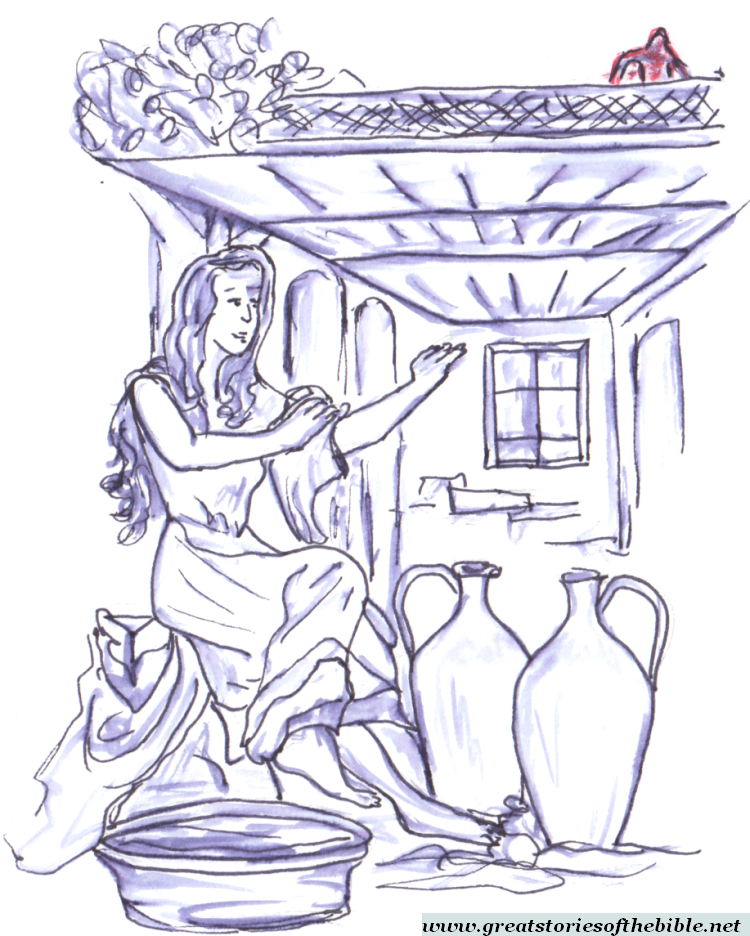Bathsheba - episode 1
You are the man
We have eventually arrived at the story of the fourth woman in Jesus’ genealogy: the wife of Uriah (in the Bible we find her in chapter 11 and 12 of the second Book of Samuel). Her story is linked to king David’s one. The times when the young shepherd, favorite by the LORD, had to run away in the desert to avoid his opponent Saul have finished; David is now comfortably settled in his palace in Jerusalem, surrounded by wives and concubines. He sleeps until late afternoon and does not go to the war, he sends his soldiers: «It happened, at the return of the year, at the time when kings go out, that David sent Joab, and his servants with him, and all Israel; and they destroyed the children of Ammon, and besieged Rabbah. But David stayed at Jerusalem. It happened at evening, that David arose from off his bed, and walked on the roof of the king’s house: and from the roof he saw a woman bathing; and the woman was very beautiful to look on». She is doing the purification bath prescribed by the Law after the menstrual cycle. His numerous wives and lovers are not enough for David. Driven by lust he wants her: he seeks information about her (she is «Bathsheba, the daughter of Eliam, the wife of Uriah the Hittite»), and, despite the fact that she is already married, «David sent messengers, and took her; and she came in to him, and he lay with her». Bathsheba falls pregnant.

To hide this bad sin the king calls back his soldier Uriah the Hittite from the war against the Ammonites; he invites him to go home and to have intercourse with his wife (in this way the pregnancy, not visible at the moment, would have been attributed to him and not to an adultery). Uriah, however, despite being a foreigner, is fair and faithful in a very touching way: «The ark, Israel, and Judah, are staying in tents; and my lord Joab, and the servants of my lord, are encamped in the open field. Shall I then go into my house to eat and to drink, and to lie with my wife? As you live, and as your soul lives, I will not do this thing!». David, then, tries to change his soldier’s opinion by getting him drunk in a dinner at the royal palace, but does not succeed: Uriah sleeps among the servants of the king, but not at his home.
Therefore David weaves a horrible plan; writes a letter to the commander of his army with this order: «Send Uriah to the forefront of the hottest battle, and retreat from him, that he may be struck, and die» and gets it delivered by the poor soldier, that, without knowing it, gives to Ioab the commander his own death sentence!
All goes as forecasted, with even more dead because of that reckless military action: «Some of the people fell, even of the servants of David; and Uriah the Hittite died also». When the days of mourning for Bathsheba were completed, David marries her, probably appearing to his people as a good king that is taking care of his courageous soldier’s widow, while he is only covering his sin. Few among the men know the truth, but the LORD, who deeply scans the heart of every person, is not unaware of the fact: «the thing that David had done displeased the LORD».
The LORD sends to the king Prophet Nathan, who tells him a parable to make him conscious of his sin: «“There were two men in one city; the one rich, and the other poor. The rich man had very many flocks and herds, but the poor man had nothing, except one little ewe lamb, which he had bought and raised. It grew up together with him, and with his children. It ate of his own food, drank of his own cup, and lay in his bosom, and was to him like a daughter. A traveler came to the rich man, and he spared to take of his own flock and of his own herd, to dress for the wayfaring man who had come to him, but took the poor man’s lamb, and dressed it for the man who had come to him.” David’s anger was greatly kindled against the man, and he said to Nathan, “As the LORD lives, the man who has done this is worthy to die! He shall restore the lamb fourfold, because he did this thing, and because he had no pity!” Nathan said to David, “You are the man”».
In the next post, we will end the story of Bathsheba and we will try to find the golden thread that joins the four women in Jesus’ genealogy: Tamar, Rahab, Ruth and the wife of Uriah the Hittite.
In the next post, we will end the story of Bathsheba and we will try to find the golden thread that joins the four women in Jesus’ genealogy: Tamar, Rahab, Ruth and the wife of Uriah the Hittite.